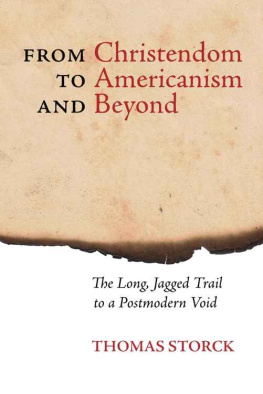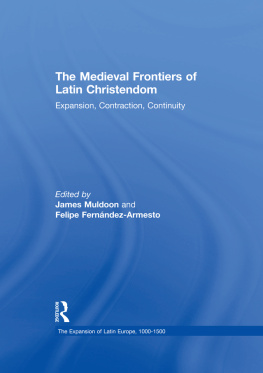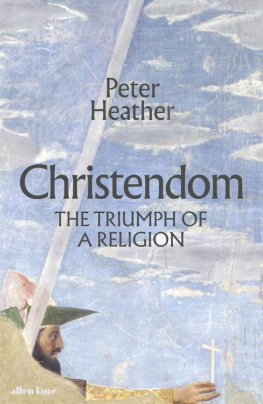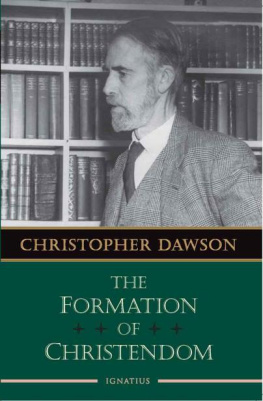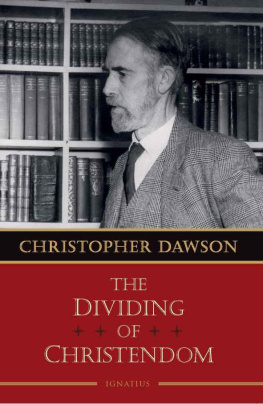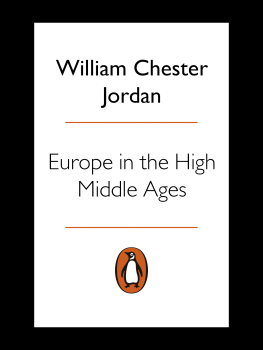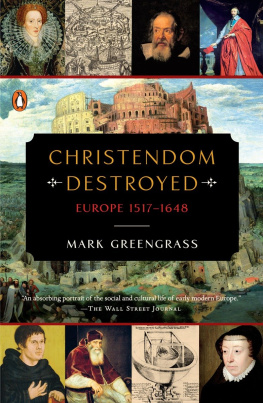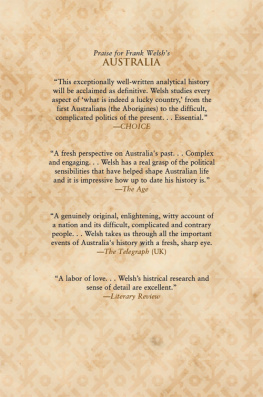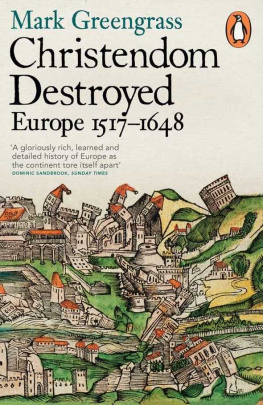From Christendom
to Americanism and Beyond
The Long, Jagged Trail to a Postmodern Void

Thomas Storck
From Christendom
to Americanism and Beyond
The Long, Jagged Trail to
a Postmodern Void

Foreword by
Joseph Pearce

First published
by Angelico Press, 2015
Thomas Storck, 2015
Foreword Joseph Pearce, 2015
All rights reserved
No part of this book may be reproduced or transmitted,
in any form or by any means, without permission.
For information, address:
Angelico Press
4709 Briar Knoll Dr.
Kettering, OH 45429
angelicopress.com
978-1-62138-144-0
Cover design: Michael Schrauzer
CONTENTS
Foreword
by
Joseph Pearce
THOMAS STORCK is a well-connected man. Indeed, there are very few men who are better connected. I do not mean that he is well connected in the sense in which the world normally thinks of being connected. He does not have legions of powerful friends walking and stalking the corridors of power who can make things happen for him. On the contrary, he has so few friends in such places that this timely and important book will certainly not make The New York Times Bestseller List, nor is it likely that the wisdom it contains will enlighten the darkened minds of that highly prejudiced journal.
Mr. Storck is well connected in a much better and more important sense. He knows and makes the connections between those branches of knowledge that have been severed from each other by the modern worlds radical disconnectedness with the wholeness of things. He makes these connections and connects himself and his understanding of things to this wholeness. Finally, as this volume and Mr. Storcks other writings testify, he connects us to this wholeness, helping us to become the well-connected people that we need to be.
First and foremost, he connects the lesser sciences of philosophy, history, politics, and economics to the queen of sciences, theology. He knows that to separate theos from logos, God from meaning, is the beginning of the dis-integration of knowledge into disconnected and atomized disciplines, each of which is effectively excommunicated from the others.
In philosophy, the humanism of the Renaissance, divorcing itself from the scholasticism that connected Man with his Creator, has led inexorably to the anthropocentrism that is the blight of our self-centered culture. In politics, such humanism has led to the cynical realpolitik of Machiavelli and the justification of Machiavellian self-interest over Christian concepts of social and political justice.
The separation of theos and logos has also led to the divorce of physics from metaphysics, separating what was once known as natural philosophy from all other aspects of the love of wisdom, thereby ensuring the decay of science into scientism.
Mr. Storck connects these radical problems, rooted in the story of mans divorce from God, to the historical developments that led to the economic, social, political, and cultural problems facing our world today. In doing so, he reminds us of others who have endeavored to do likewise. We think perhaps of the works of Christopher Dawson or R.H. Tawney, or of Chestertons The Everlasting Man, written as a charitable response and riposte to H.G. Wellss superciliously progressive Outline of History, or of Hilaire Bellocs own response to Wells, less charitable but nonetheless effective, in his Companion to Mr Wellss Outline of History. Apart from his war of words with Wells, Belloc also wrote panoramic studies of history, such as The Servile State, Survivals and New Arrivals, and The Great Heresies, each of which illustrated that ideas have consequences and, more specifically, that bad ideas have bad consequences.
Like his illustrious forebears, Mr. Storck illustrates that ones philosophical presuppositions will invariably and inevitably color ones understanding of the outline of history. He understands the beliefs of the past and why people acted as they did; he sees why things happened, as well as when and how they happened. Such a vision of the past contrasts starkly with the progressive view of history now in the ascendant, which regards the beliefs of the past as primitive and superstitious and therefore unworthy of serious consideration. This chronological snobbery blinds the secular historian to the ideas that motivated the actions of the past, thereby preventing modernitys understanding of history from rising above the when and how. In stark and much-needed contrast, Mr. Storck shows that the when and how are determined by the why.
Once again, Mr. Storck emerges as a worthy heir of Hilaire Belloc. In history we must abandon the defensive, Belloc had written in 1924,... We must make our opponents understand not only that they are wrong in their philosophy, nor only ill-informed in their judgement of cause and effect, but out of touch with the past: which is ours.
Like Belloc, Chesterton, and Dawson, Mr. Storck insists that the history of Western civilization can only be comprehended if we see it as Christendomas the cultural and political manifestation of the fruits of the Faith, and for this reason he shows that the history of modernity can only be comprehended if we see it as an anthropocentric rebellion against Christendom and the Christocentrism that informed it.
As in Survivals and New Arrivals and The Great Heresies, in which Belloc maps the war of ideas that forged the history of the modern world, Mr. Storck illustrates in the present volume how the historian can emerge as a prophet, not only teaching us about the past but also warning us of the abyss we shall face if the ill-fated path we have been following is not abandoned. Like Belloc, Thomas Storck is not merely an historian but also a prophet. He must be heard and heeded.
. Hilaire Belloc, Preface to Dom Hugh G. Bevenot, OSB, Pagan and Christian Rule (London: Longmans, Green & Co, 1924), ix.
Introduction
THIS BOOK is not a history of the last few centuries. Neither is it a history of the Church nor an intellectual history of Europe or the United States. Rather its aim is to be a guide to understanding that history, to understanding the last several hundred years, particularly the way ideas about the social order have changed and the immense implications of those changed ideas for modern thinking about politics, about economics, about art, and in fact, about nearly every other aspect of human lifeand, by implication, about what might be the proper response of Catholics to these changes.
It might seem that when we look at the history of any particular time or place, the task is simply to note down what happened and then to try to make sense of it. But even what we should note down will often not be obvious if we do not already have some framework for interpretation. The past abounds in facts, but which are important and why? Should we view the nineteenth century as a record of increasing freedom or of increasing dechristianization? as the triumph of the Industrial Revolution or the destruction of traditional ways of life? Depending on which historical process we think primary or important, we shall probably highlight certain events and ignore others. And which we think primary and important will depend on our own first principles. A non-Christian historian who sees any form of Christian faith as an unfortunate survival of mythological thinking will probably pay attention to the diminishing place of Christianity in the public life of Europe, chiefly in the context of the triumphs of natural science and of philosophies that set themselves against all religious belief. A Catholic, on the other hand, even when looking at the same facts or events, will not only understand them differently, but will also have a different organizing principle for recounting and evaluating them. This book is intended to help the reader place the events of the past several centuries into a Catholic context, to understand them relative to the Churchs unique place in human history, which is ultimately founded on the unique place of the Incarnation in historythe actual coming of God upon earth for the salvation of mankind and the Churchs subsequent mission to evangelize all of human life, to shape cultures, not merely to provide religious solace and foster private piety and morality.
Next page
